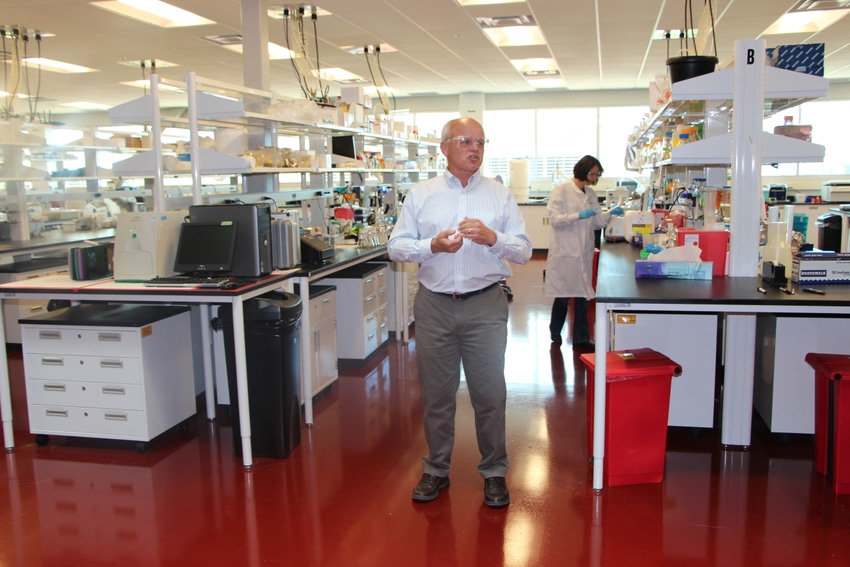October 6, 2014

Plant health company Verdesian Life Sciences took the media behind the gates of the Los Alamos National Laboratory in New Mexico this week to see where the technology for its plant health product Take Off was discovered. The technology increases the metabolism in plants to help them grow better.
“From the 1920s to 1970s, farmers saw a nice increase in crop yields per acre with mechanization and hybrid seed,” says J.J. Grow, CEO of Verdesian. “But yields have slowed down drastically since then. With a growing demand for food and regulatory issues with nitrogen and phosphorous application, we need to develop new ways to increase yield, and we think plant health and nutrition products are the best mechanism to do that.”
Take Off, launched in 2012, is classified as a metabolic plant stimulant that helps the plant capture and process nitrogen more efficiently. By making nitrogen more available to the plant, the product can provide a yield boost of 10%, according to independent field trials in multiple types of crops. It also improves nutrient uptake, which can reduce use rates for lower input costs and less nitrogen runoff. It can be applied to seeds, foliage and roots.
Los Alamos National Laboratory, known for its development of the first atomic bomb, is one of the largest science and technology institutions in the world. It is using the same technologies it uses in national defense to study crops. The lab says agronomy is a relatively new area of focus for them due, in part, to the threat of bioterrorism. All of the scientists who worked on Verdesian’s Takeoff product had at one time worked in nuclear weapons research.
Retired LANL scientist Pat Unkefer was one of the scientists who discovered the growth accelerant, which Verdesian now markets under the brand name Take Off. She and her research colleagues were testing for pathogens in plants and found that a metabolite, 2- oxoglutaramate, made the plants grow faster.
“One of the most common themes in scientific discovery is the role of serendipity,” Unkefer says. “So we had the good fortune to see this, and the guts, smarts and perseverance to follow it through.”
Verdesian started working with the Los Alamos National Laboratory in 2004, when it obtained the license to use the technology. Take Off can be applied alone or deployed in other vehicles to get it to the plant including seed treatments, pesticides, and fertilizer. Nigel Grech, executive vice president of science and technology with Verdesian, says the next step, which is six to seven years out, will be to modify plants transgenic ally to express this technology in their metabolism.
The message from the company, through the trip, is that Verdesian products are based on science.
Verdesian, headquartered in Cary, NC., is a relatively new company, built solely on acquisitions (see sidebar). In the past 22 months, Verdesian has purchased six companies to develop a full portfolio of nutritional catalysts, seed inoculants/treatments and plant health and nutrition technologies.
Grech says the company holds a unique space in the market. “This [plant health and nutrition] space was identified because there is a huge gap in the market,” Grech says. “You are either in the transgenic plants business, the agrichemical field, or the fertilizer business. There’s nobody in this space that integrates all of the elements with the type of science we have.”
Adds Grech: “We are making the wheels, or enzymes, inside the plant turn faster. And the key one for us is when nitrogen comes into the plant and making it into protein. So we are up-regulating the protein synthesis machine of the plant through the licensed technology at the lab.”
Verdesian is working with the lab on several other projects, too, that will lead to more plant health and nutrition products. The company expects to bring 18 new product technologies to market over the next one to five years.
“We are a science- and technology-based company and are bringing innovative products to marketplace,” says Verdesian’s Grow. “Today we used Take Off as example of that, but we have several more products along those lines that we will be bringing to the market.”
Building a plant health and nutrition company
Verdesian has acquired, or formed agreements with, the following companies in the last 18 months to build its product portfolio in plant health and nutrition products:
September 2014: QC Corporation--granular and dry micronutrients and ferrous sulfate products.
August 2014: Mitsui Chemicals Agro, Inc. (MCAG), Hokusan Co., Ltd.—licensing agreement to sell these companies’ agrochemicals, including Systemic Acquired Resistance (SAR) technologies, for wheat and barley.
July 2014: Specialty Fertilizer Products (SFP)--fertilizer efficiency products, inoculants and seed treatments
May 2014: Nufarm—Exclusive marketer and seller of its Bloomtime biological for apples and pears.
September 2013: INTX Microbials--inoculants, seed treatments, and biological growth enhancement products.
April 2013: Plant Syence--Plant health products, manufacturer's representative for Verdesian in the United Kingdom and continental Europe.
February 2013: Northwest Agricultural Products--eco-friendly chemicals and biologicals.
Like what you’re reading? Subscribe to Farm Industry News Now e-newsletter to get the latest news and more straight to your inbox twice weekly.
You May Also Like




